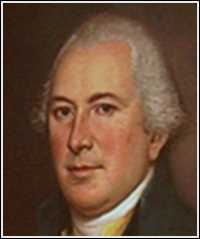A Biography of Thomas Mifflin 1744-1800
 A member of the fourth generation of a Pennsylvania Quaker family who had emigrated from
England, Mifflin was born at Philadelphia in 1744, the son of a rich merchant and local politician.
He studied at a Quaker school and then at the College of Philadelphia (later part of the University
of Pennsylvania), from which he won a diploma at the age of 16 and whose interests he advanced
for the rest of his life.
A member of the fourth generation of a Pennsylvania Quaker family who had emigrated from
England, Mifflin was born at Philadelphia in 1744, the son of a rich merchant and local politician.
He studied at a Quaker school and then at the College of Philadelphia (later part of the University
of Pennsylvania), from which he won a diploma at the age of 16 and whose interests he advanced
for the rest of his life.
Mifflin then worked for 4 years in a Philadelphia countinghouse. In 1764 he visited Europe, and the next year entered the mercantile business in Philadelphia with his brother. In 1767 he wed Sarah Morris. Although he prospered in business, politics enticed him.
In the Pennsylvania legislature (1772-76), Mifflin championed the colonial position against the crown. In 1774 he attended the Continental Congress (1774-76). Meanwhile, he had helped to raise troops and in May 1775 won appointment as a major in the Continental Army, which caused him to be expelled from his Quaker faith. In the summer of 1775 he first became an aide-de-camp to Washington and then Quartermaster General of the Continental Army. Late in 1775 he became a colonel and in May 1776 a brigadier general. Preferring action to administration, after a time he began to perform his quartermaster duties perfunctorily. Nevertheless, he participated directly in the war effort. He took part in the Battles of Long Island, NY, Trenton, NJ, and Princeton, NJ. Furthermore, through his persuasive oratory, he apparently convinced many men not to leave the military service.
In 1777 Mifflin attained the rank of major general but, restive at criticism of his quartermaster activities, he resigned. About the same time, though he later became a friend of Washington, he became involved in the cabal that advanced Gen. Horatio Gates to replace him in command of the Continental Army. In 1777-78 Mifflin sat on the Congressional Board of War. In the latter year, he briefly reentered the military, but continuing attacks on his earlier conduct of the quartermastership soon led him to resign once more.
Mifflin returned immediately to politics. He sat in the state assembly (1778-79) and again in the Continental Congress (1782-84), from December 1783 to the following June as its president. In 1787 he was chosen to take part in the Constitutional Convention. He attended regularly, but made no speeches and did not play a substantial role.
Mifflin continued in the legislature (1785-88 and 1799-1800); succeeded Franklin as president of the Supreme Executive Council (1788-90); chaired the constitutional convention (1789-90); and held the governorship (1790-99), during which time he affiliated himself with the emerging Democratic-Republican Party.
Although wealthy most of his life, Mifflin was a lavish spender. Pressure from his creditors forced him to leave Philadelphia in 1799, and he died at Lancaster the next year, aged 56. The Commonwealth of Pennsylvania paid his burial expenses at the local Trinity Lutheran Church.
